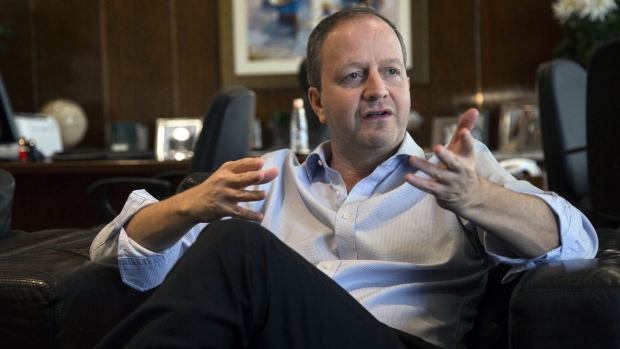Apr 18, 2024
Paraguay Eyes Window to Further De-dollarize Debt in Second Half
, Bloomberg News

(Bloomberg) -- Paraguay might swap some of its US dollar debt for longer duration local currency bonds in the second half of the year if it can do so at favorable interest rates, Finance Minister Carlos Fernandez said.
“We have a large share of our indebtedness denominated” in US dollars, Fernandez said on the sidelines of the annual International Monetary Fund meetings in Washington DC. “If conditions continue to improve, we could continue the process of de-dollarizing Paraguay’s debt.”
Read more: Paraguay Taps Credit Markets With Dollar Note Amid Debt Buyback
Paraguayan law gives the Finance Ministry the discretion to issue new debt to repurchase or swap existing debt to lengthen maturities and lower borrowing costs.
Paraguay has increased its sale of local currency debt in recent months. The administration of President Santiago Pena has sold the equivalent of more than $340 million in domestic guarani bonds since last December and issued the first global guarani bond for about $500 million in February. The landlocked country of about 6.1 million people had about $6.1 billion in outstanding US dollar global bonds at the end of 2023, according to Finance Ministry data.
Paraguay’s economy is expected to grow 3.8% this year, down from 4.7% in 2023. Slowing inflation has allowed the central bank to cut its benchmark interest by 250 basis points in the last eight months to 6%. Its low inflation rate and disciplined public finances have won praise from credit agencies, though the country has yet to win an investment grade rating.
The 2031 guarani bond, which placed with a coupon of 7.9%, currently yields 7.32%, according to data compiled by Bloomberg.
“The guarani bond we launched in February is performing well, which indicates to me there is appetite and the possibility to obtain an even lower interest rate than what we sold it at,” Fernandez said.
Fernandez said Paraguay is working with the IMF and Inter-America Development Bank to borrow money whose cost of funding is tied to environmental targets as part of its foray into sustainable finance.
“Next year we’ll see what space we have to issue a green bond,” he said.
Other key items from the interview:
- Fernandez attributed the breakdown in Mercosur-EU trade talks to political, not economic, reasons
- Mercosur is close to reaching a trade agreement with the United Arab Emirates
- ”We are betting on seeing what other counties can occupy that space left by the Europeans,” he said.
©2024 Bloomberg L.P.








